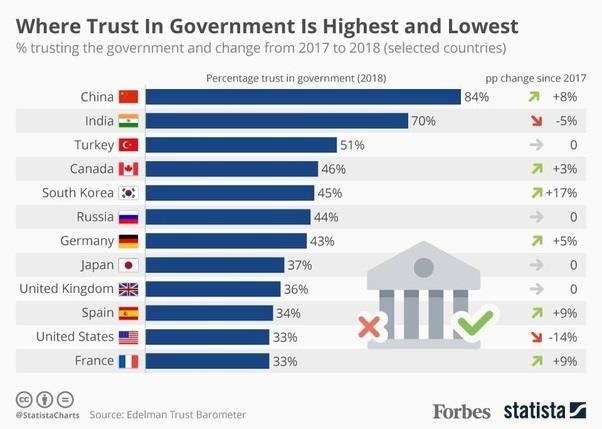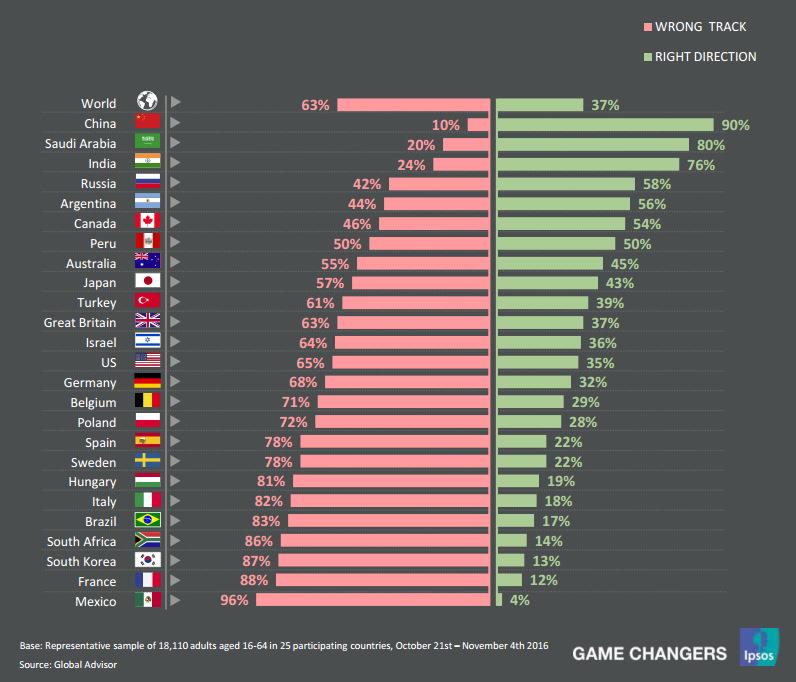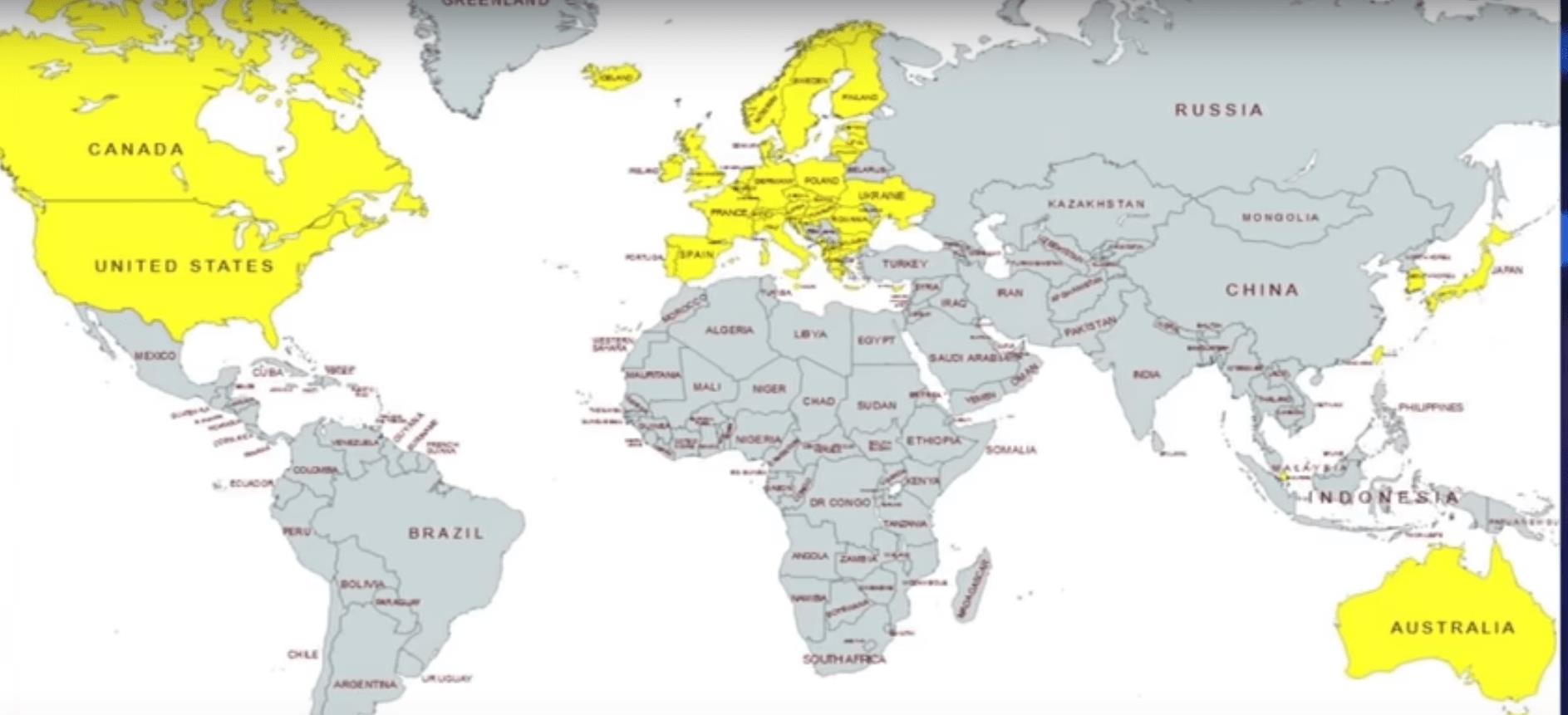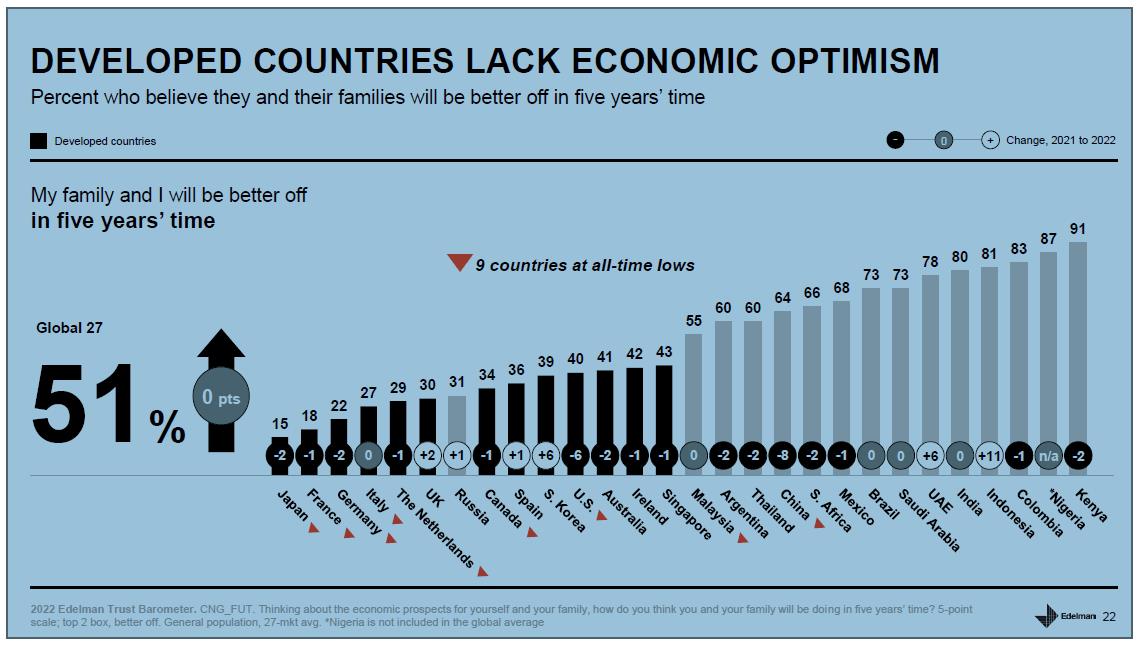(MENAFN- Asia Times) Democracies have had a dismal start in the 21st century. Opinion surveys around the world show a counter-intuitive trend: Citizens of Democratic nations are more pessimistic about the future of their countries than people living in quasi-democratic or one-party states, often by wide margins.
Similar trends can be seen when people are asked about the level of trust in their government. Democracies generally score lower than non-democracies. China scores more than 50% higher than the US, Japan, the UK and France.
The notable exception is India. Despite battling with the divisive caste system and poverty, India is the only major democracy that scores high in optimism about the direction of the country and trust in government.

Trust in government and democracy do not always go hand in hand.
International surveys can be impacted by cultural factors. A Thai person may be more reticent to question the direction of the country or the government that American or French citizens. But taken by themselves, it is clear that leading democracies are in the grip of doom and gloom.

Public perception of countries going in the right or wrong direction.
Part of the reason is economic. Fifty years ago, most families in the West had one breadwinner and lived well. Today, more often than not, both parents work. Many breadwinners of single-parent families belong to the“working poor.”
In the 1980s, Asian economies chipped away at the industrial and economic dominance the West had enjoyed in the postwar years.
Japan virtually wiped out the Western consumer electronics industry. It was set to do the same with the Western car industry until it agreed to“voluntary” export restrictions, giving Western makers time to retool their factories.
Western corporations responded by moving production to Asia. This reduced the number of jobs in industry and hollowed out the tax base. The emergence of neoliberalism led to growing wealth discrepancy and shrinking social safety nets.
Today, millions of children in advanced democracies grow up in poverty. Reports of elderly citizens skipping meals because of poverty are common. A majority of citizens of nearly all advanced Western democracies express concern that their living standards will further decline.
In most democracies, progressive and conservative parties take turns in governing. Virtually all democracies have incurred massive government debt, in most cases exceeding 100% of GDP. In Japan, it is closer to 300%.
All of this debt will be charged to the next generation and comes with enormous opportunity costs: The billions spent on servicing debt can't be spent on education, infrastructure, and health care.
This raises the question of why voters continue to elect political leaders who perpetuate policies that lead to growing inequality, poverty and debt, not to mention endless foreign military intervention in countries far from their own borders.
The growing public disillusion exposes an inherent weakness in the democratic process. In most democracies, it is difficult for a political candidate to get elected to high office on the promise of reducing government spending and belt-tightening. More often than not, political candidates will try to outbid their opponents by promising additional spending, be it for defense, green tech, or affordable housing.
The conflict in Ukraine has amplified such problems. The sanctions war on Russia has increased the cost of living for millions of Europeans and exacerbated the debt crisis. But it also exposed another problem with democracy.
Newspeak
In the past few decades, the West saw a drastic consolidation of the news media. In the US, four conglomerates control the media. The legacy print media, nearly wiped out by the Internet, was rescued by billionaires who turned their media properties into echo chambers of the government.
In Europe, state-controlled entities like the British Broadcasting Corporation and Deutsche Welle continue to have an outsized influence on shaping public opinion. Shaping public perception is as much slanted reporting as the non-reporting of news that conflicts with the official narrative.

The 'international community' sanctioning Russia.
Concentrated media power explains the nearly unanimous Western support for the war in Ukraine. Nearly all of the media ignored the historical causes of the conflict and the reason for the North Atlantic Treaty Organization's expansion to the east.
In the words of Hastings Ismay, the first secretary general of NATO, in 1952, the purpose of the alliance was“to keep the Soviet Union out, the Americans in, and the Germans down.” The Ukrainians are paying a dear prize for the Western obsession with Russia.
Echoing the political elite, the Western media framed the Ukraine conflict as a battle between freedom and democracy on the one hand and authoritarianism and tyranny on the other:“We are democratic, he is a tyrant” is sufficient to claim the moral high ground.
The West uses the same rationale to judge geopolitical opponents around the world. They look at levels of democratic governance, human rights, and freedom of the press rather than levels of food security, access to clean drinking water, medical services, and education.
But Ukraine may be a turning point. It has exposed West's self-referential logic. When NATO officials argue that Russia had nothing to fear from NATO expansion, they assume that Russia sees the West the same way as the West sees itself.
Ukraine also illustrates that the West is not quite used to dealing with an opponent that, unlike Iraq or Libya, can defend itself. It explains the psychology behind the self-harming sanctions. The consequences of such self-righteousness are becoming painfully clear.

When democracy becomes an end in itself rather than a means to an end.
The Netherlands, one of the richest countries in the world, reports that half of its 8 million families have financial difficulties. In the UK, 4 million children live with food insecurity. In Germany, food banks are overwhelmed and poverty has reached record levels. The Western political elite is increasingly compared to the crew of the Titanic.
In 1947, Winston Churchill gave a speech in the British House of Commons. The speech is the source of an often (mis)quoted statement he made about democracy:
Six years after Churchill spoke these memorable words, he engineered a coup in Iran. Churchill was an employee of British Petroleum before he became prime minister. In collusion with US president Harry Truman, he engineered the 1953 overthrow of Iran's Mohammad Mosaddegh in order to reclaim the nationalized assets of BP. Mosaddegh was the first democratically elected leader of an Islamic country.
Some 50 years after Truman and Churchill deposed Mosaddegh, US president George W Bush and UK prime minister Tony Blair colluded to depose Saddam Hussain to“bring democracy to Iraq.” Assuming democratic idealism was a motivating force (and ignoring the fact that Saddam, like Muammar Gaddafi, undermined the petrodollar system), this proselytizing impulse has roots in Christianity but is as self-serving as it was during the colonial era.
The war in Ukraine is a turning point. It has united the Global South, Russia and China, and it started the process of de-dollarization. The old imperialist tool of divide and conquer has come to an end, the reason China was able to negotiate an end to the hostile relationship between Saudi Arabia and Iran.
After the inevitable defeat in Ukraine, the footprint of the Western rules-based world order will shrink rapidly. It will be filled by BRICS+, a growing alliance of Russia, China, and former Western colonies that will offer an alternative to the global dollar-based monetary system.
Europe, the home of democracy, will find itself caught between a rock and a hard place. It will be cut off from the resource-rich Eurasian continent, heavily in debt, internally divide (save for its proxy war on Russia), and financially joined at the hip to an equally indebted United States.
If an economic implosion caused by an unsustainable debt bubble can be avoided, the West will have time to do some soul-searching and ask whether serial involvement in foreign wars, growing income inequality, and children growing up in poverty really is“the will of the people.” Whatever the outcome, the world is in the midst of the most significant geopolitical transition since the days of Christopher Columbus.